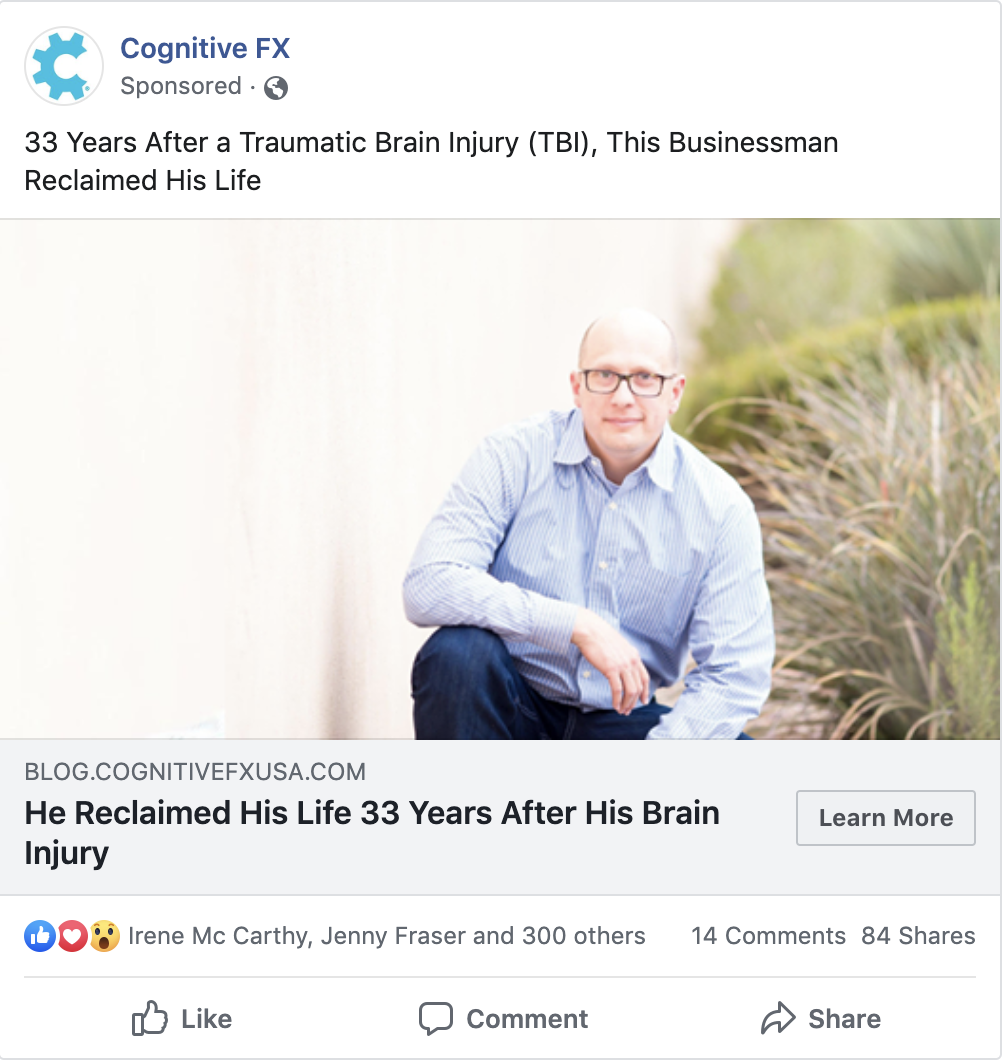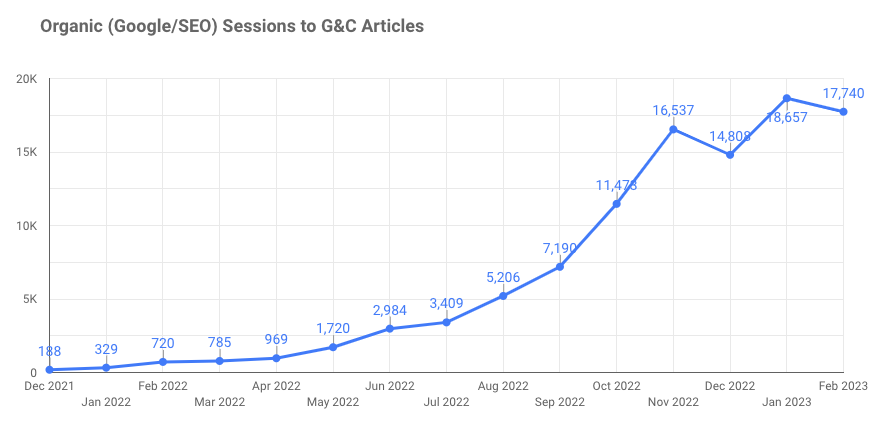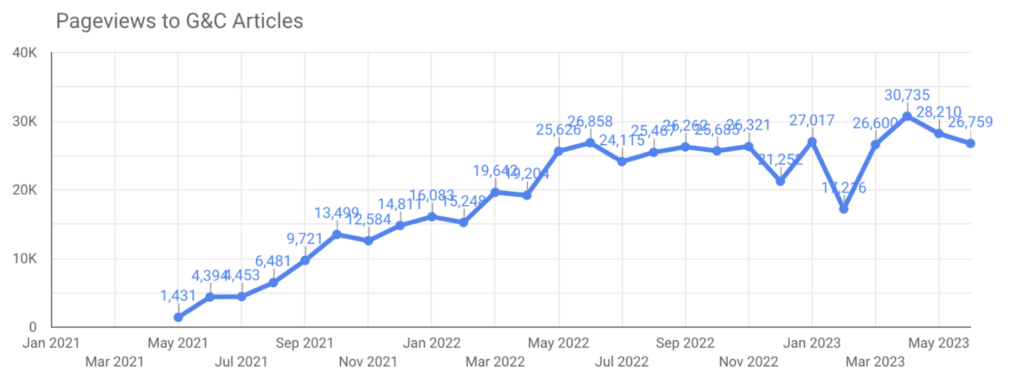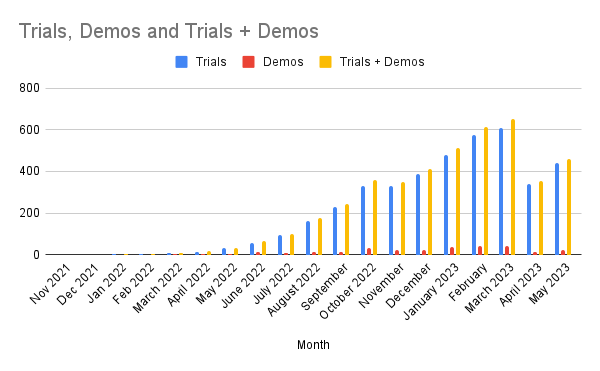The idea behind Grow and Convert stemmed from our prior experiences trying to hire content marketing agencies and being disappointed in what they delivered.
A good story of this is Benji’s (my Co-founder’s) experience trying to hire a content marketing agency for his prior company, ThinkApps. He tells it in detail in our agency positioning case study, but in summary he ran into 3 major “gaps” in the market (i.e. shortcomings of most content marketing agencies, and, to be honest, content marketers as well).
Gap 1: Content Agencies Were Unwilling to Be Accountable to Leads Generated
This was the biggest issue. Benji was running all of marketing for ThinkApps at the time, so the metric he was accountable for was leads generated. But when he talked to agency after agency, they refused to be held accountable for leads generated. Their deliverables, they said, were about content output:
“We’ll produce ‘N’ articles a month”
“Each article will have a minimum word count of ‘N’”
But Benji and his team, like many marketing teams, didn’t really want the content, he wanted the results from content, which for his B2B company was leads (more specifically, qualified leads that close at a high rate).
What’s worse is that many weren’t even willing to hold themselves accountable to traffic, one step before leads. They would just say “Well, over time, you should start to see organic traffic increase.” Or they didn’t distinguish between branded organic traffic and non-brand organic traffic (which we focus on).
This problem applies to B2C companies as well, but is especially acute for B2B companies, because for them lead quality and traffic quality matter more than volume.
This is in contrast to, say, affiliate sites where you’re playing a content volume game: producing as much content as possible to try to rank for as many keywords as possible.
For these brands, the content can be extremely basic. You’re not trying to win trust with a business customer in a complex niche that has a 6 month sales cycle. You’re just trying to show up for a consumer-based search term like “top running shoes for men” (and dozens or hundreds of similar search queries) with a simple list with some basic info for each product (thus any outsourced freelance writer or even AI can produce it) — it’s just a matter of producing enough to rank for enough of those keywords.

In contrast, for businesses in specialized niches, with customers that have advanced knowledge in the space, this doesn’t work. They need more advanced content, which takes us to gap #2.
Gap 2: Most Content Agencies Couldn’t Produce Advanced or Specialized Content
Many of our clients sell expensive, advanced B2B software or services They have contract sizes over $100,000. That kind of B2B customer is savvy. They have advanced questions about these products and services. Many have tried alternative solutions before and want a better option.
In short: they are not beginners.
This is true for a ton of B2B companies (not just enterprise) and even many B2C companies. For example (these are drawn from our actual clients):
- [B2B] A server backup platform sells to heads of IT that have decades of experience.
- [B2B] A sales app company sells to sales teams and managers that have been using sales software for decades.
- [B2C] A concussion treatment center has patients who have had concussion symptoms for months or years and talked to multiple doctors and Googled a ton of information about it — their queries are not simple.
Most agencies and in-house teams just outsource content creation to freelance writers with minimal, if any, domain expertise, who are just given a topic (“Write about sales CRM apps”) and asked to come up with the argumentation on their own. They end up producing what we call “Google research papers” where like college students, they Google a topic and more or less regurgitate arguments others are already making. The problem is the target customers already know more than this beginner level information on those topics. So how is that blog post supposed to impress savvy potential customers? It can’t.
This is why so many companies consistently create introductory, beginner level content. Things like:
What VP of marketing is dying to know the top 10 trends in their own industry, or worse, read yet another “Beginner’s Guide” in the field they’ve been in for years?

This type of beginner level content does not address actual pain points that savvy customers (typically B2B, but sometimes B2C) have.
It’s not great content, even if it hits some arbitrary length requirement, and has a beautiful web design or user experience. We call this mirage content — it sounds as though it should work, but when inspected closely, it doesn’t.
So we knew, to become top content marketing agency, we needed a system to be able to produce advanced level content for advanced customers.
Gap 3: Most Content Agencies Don’t Have Real Distribution or Promotion Processes
We’ve written about this a lot, and readers and clients have said this over and over: content promotion and distribution is a huge pain point.
It’s also not easy. You have to be creative and keep testing new things. For example, historically we had relied on a process we coined called community content promotion. However, once communities on Facebook and LinkedIn became less active, we had to switch our strategy to focus on distribution through paid advertising.
The digital agencies Benji talked to during his search said they helped promote the content (dropping phrases like “social media marketing”), but when he dug in he realized this consisted of writing a few social media posts for you and sharing them out on your social channels.
That’s not enough to get real results. We knew we wanted our content agency to be full service, and that requires reporting on business results: traffic and leads.
We Built Our Content Marketing Agency to Solve These Problems
So with the gaps identified, we had the basis of a content strategy to offer a service we were proud of. It was just a matter of creating systems to solve the problems above.
We felt that if we could do that, we would genuinely have one of the best content marketing agencies around because a single service that could offer all of the solutions below was exceedingly rare (we have yet to find anyone else that can do all of this).
To explain these solutions, I’m actually going to go in a different order than the above.
I’ll start with how we produce advanced content, then how we promote that content to get traffic and links, then I’ll end with how we measure and hold ourselves accountable to traffic and leads.
Solution 1: How We Produce Advanced, Industry Specific Content
Here are some actual blog posts we’ve produced for clients recently:
- A post on neuroplasticity treatment for concussions for a concussion treatment center.
- A post on S3 file gateways for a company that helps with file access through the cloud.
- A post on the intricacies of ad networks for a header bidding solutions company.
These are advanced topics that require:
- Knowledge that the target audience actually has these pain points. For example: Do they care about neuroplasticity treatment, the best ways to sync files through the cloud, or what’s the best way to monetize my high traffic site?
- A process for answering these advanced questions at a level that an industry veteran or knowledgeable consumer would feel matches their own.
For the first requirement, we do extensive interviews with customer-facing employees in the client’s company – typically sales, customers support, and product teams – , which we’ve written about at length. This ensures our topics are on the pain points that their target customers actually have, which results in higher conversion rates.
For the second requirement, we do follow-on interviews with subject matter experts inside the client’s company again on the specific topics we’re writing about. This is how we can get the exact brand voice and nuanced arguments that your company wants to make on each topic instead of just coming up with generic arguments that we self-research by Googling around for a couple of hours. This makes a massive difference in content quality. It takes pieces from beginner level (a writer tried to become an expert in a day) to advanced (the piece accurately conveys your company’s deep understanding about your space).

To be clear, we’re not talking about grabbing a few quotes from experts to throw into an article. We’re talking about hour long recorded interviews with experts inside the client’s organization where we shape an entire article around the viewpoint and knowledge of your company.
This changes everything. It creates true thought leadership content. Customers notice and conversion rates increase.
Solution 2: We Have a Two Pronged, Active Content Promotion Process
We knew that to really feel like we had one of the best content marketing agencies in the market, we had to be able to drive serious traffic to articles ourselves, not just post on the client’s social media accounts a few times.

To do that, we have a 2-pronged process:
- Paid Ads / PPC (Short Term Traffic). We use Twitter ads, Facebook ads and/or Google ads in the first 6 months to drive short term traffic to the articles we publish.
- Link Building (Long Term Traffic). When certain pieces start ranking for keywords, we strategically deploy link building to boost them to page 1 or the top of page 1 in Google. We do this via guest posting and editorial links.
The combination of paid ads to give a short term boost in traffic, followed by long term sustainable organic traffic helps grow traffic over time.
We do all of the above from our own budget, no extra spend for our clients. This is markedly different from other marketing agencies and something we’re very proud of offering our clients.
Solution 3: We Hold Ourselves Accountable to Traffic and Lead Growth
The above solutions already set us apart from other options companies have for getting content marketing done: agencies or even full time hires.
- Instead of producing beginner level fluff content that savvy customers don’t care about, we produce advanced content at the level of knowledge of the target customer on pain points they actually care about.
- Instead of just publishing, tweeting it out a few times, and hoping for traffic and links, we actively promote, with paid ads, and build links strategically, driving both short term and long term (SEO) traffic.
But what they enable is for us to provide our ultimate goal: be responsible for and report on traffic and lead growth from our content. This is what we define as a truly “full-service” content marketing agency.
For example, here are some traffic growth graphs for a few different clients.
A B2B SaaS company for marketers:

A SaaS company that sells to small businesses:

A concussion treatment center that sells to individuals:

You can see the graphs are very different for these clients, both in shape and size. That’s normal.
We’re happy to share those differences and don’t shy away from showing that not all businesses are supposed to have the same traffic. For some, like the B2B SaaS company, they care way more about traffic quality (landing an enterprise customer) than they do about quantity.
We also track and report on leads generated from our content. For example here is a nice lead growth graph from one of our clients:

It’s not as straightforward to measure leads from content as, say, paid ads. So we measure it in 2 ways: people who converted after seeing our blog posts at any point in their journey, people who converted after seeing our blog posts as the first step in their journey. We wrote about this in detail here and have published extensive update on how we measure this in GA4 (including a walkthrough video) here.
If You Are Interested in Working With Us, Here Are Details
Finally, if you feel the above resonates with you. You can read more details about our service and the price point on our work with us page.
